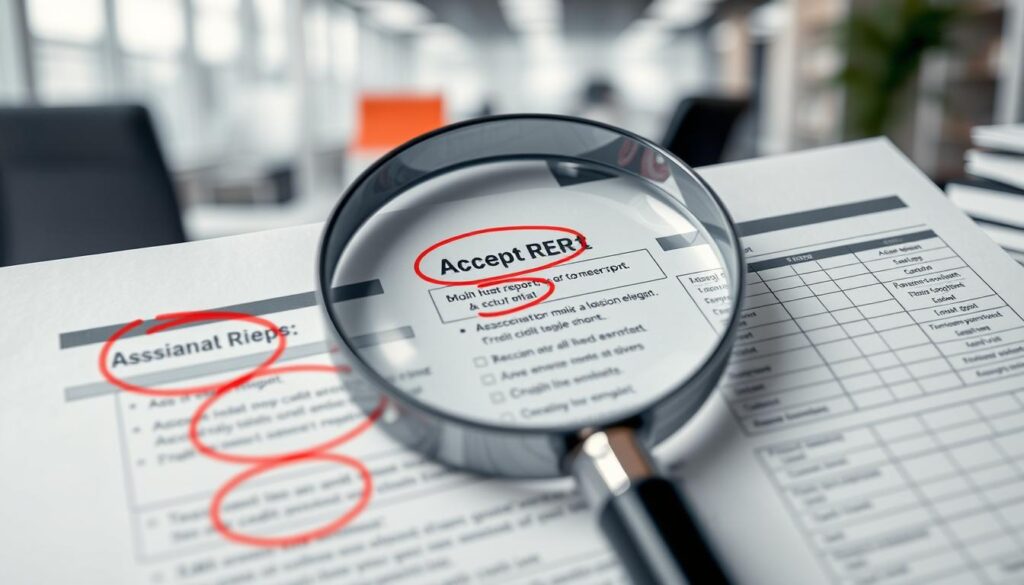A clean credit report is vital for your financial health. Unfair or wrong remarks can hurt your creditworthiness. This can make getting loans, credit cards, or housing tough.
This guide offers strategies to remove remarks from your credit report. You’ll learn how to fix your financial standing. We’ll show you how to open up new chances.
Key Takeaways
- Understand the different types of remarks that can appear on your credit report and their impact on your credit score.
- Learn how to identify inaccurate or unfair remarks and gather the necessary documentation to dispute them.
- Discover the step-by-step process for effectively communicating with credit bureaus and creditors to get remarks removed.
- Explore strategies for dealing with persistent negative remarks and when to seek professional help.
- Understand your rights and take proactive steps to prevent future negative remarks on your credit report.
Understanding Credit Report Remarks
Your credit report details your financial history. It affects your ability to get loans, credit cards, and even jobs. Understanding credit report remarks is vital for maintaining good financial standing.
Types of Remarks on Credit Reports
Credit reports can include various remarks. These range from negative information to positive payment history. Common remarks include:
- Late payments
- Charge-offs
- Bankruptcies
- Foreclosures
- Debt collections
- Repossessions
- Inquiries (hard and soft)
Impact of Negative Remarks on Credit Scores
Negative remarks can greatly affect your credit scores. The impact depends on the type, frequency, and recency of the event. Recent bankruptcies or foreclosures have more severe effects than old late payments.
Negative remarks can lower your credit score. This makes it harder to get loans, credit cards, or housing. Keeping a clean credit report is key to a strong credit profile.
| Type of Remark | Typical Impact on Credit Score |
|---|---|
| Late Payment | 40-110 points |
| Charge-Off | 80-150 points |
| Bankruptcy | 150-250 points |
| Foreclosure | 85-160 points |
The actual impact on your score can vary. It depends on your overall credit profile and specific circumstances. Monitor your credit report regularly to maintain a healthy credit score.
Identifying Inaccurate or Unfair Remarks
Reviewing your credit report is vital for spotting inaccurate or unfair remarks. These errors can hurt your credit score. They may include wrong late payments or accounts that aren’t yours.
Get a copy of your credit report from Experian, Equifax, and TransUnion. Check each report carefully, focusing on accounts, payment history, and any remarks.
Look for these red flags:
- Accounts you don’t recognize
- Incorrect payment histories, such as late payments you know you made on time
- Accounts that should have been closed but are still reported as open
- Incorrect personal information, such as an incorrect address or employer
- Duplicate accounts or inquiries
- Remarks related to identity theft or fraud that you did not authorize
If you find errors, document them well. Prepare to dispute these with the credit bureaus. This process takes time, but it’s crucial for your credit report’s accuracy.

Your credit report affects loans, credit cards, housing, and job opportunities. Take time to review and fix any issues. This helps you control your credit and improve your financial future.
How to Get Remarks Removed From Credit Report
Step-by-Step Guide to Disputing Remarks
Removing unwanted remarks from your credit report can be challenging. But with a systematic approach, you can successfully challenge these issues. This guide will help you dispute inaccurate or unfair remarks on your credit report.
Follow these steps to improve your financial standing. With patience and effort, you can work towards a clean credit history.
- Obtain a copy of your credit report: Start by requesting a free annual credit report from each of the three major credit bureaus – Equifax, Experian, and TransUnion. Carefully review your report to identify any problematic remarks.
- Gather supporting documentation: Collect any evidence, such as receipts, statements, or correspondence, that can support your case for removing the disputed remarks.
- Draft a dispute letter: Craft a clear and concise letter to the credit bureau, outlining the specific remarks you are disputing and providing the supporting documentation.
- Submit the dispute: Send your dispute letter and supporting documents to the credit bureau via certified mail, with a return receipt requested. This will ensure that your dispute is properly received and processed.
- Follow up: Monitor the status of your dispute and be prepared to follow up with the credit bureau if necessary. The credit bureau has 30 days to investigate your claim and respond.
- Verify the removal of the remarks: Once the credit bureau has completed its investigation, review your credit report to ensure that the disputed remarks have been removed or updated accurately.
Persistence is crucial when disputing remarks on your credit report. Pay close attention to details throughout the process. This will help you effectively navigate the dispute and achieve better results.
The journey to a spotless credit report takes time. But the rewards are worth it. You’ll enjoy improved financial opportunities and peace of mind.
Gathering Supporting Documentation
Solid evidence is key when disputing credit report errors. Strong documentation can boost your chances of removing negative items. Let’s look at what documents you should gather.
Collecting the right proof can make your dispute more convincing. It’s worth taking time to organize your supporting documents carefully.
- Payment records: Gather any documentation that shows you made timely payments, such as bank statements, canceled checks, or payment confirmation receipts.
- Correspondence with creditors: Keep copies of any letters, emails, or other communication you’ve had with the creditor regarding the disputed remark.
- Proof of identity: Provide copies of your driver’s license, Social Security card, or other government-issued ID to verify your identity.
- Proof of address: Submit documents that confirm your current and previous addresses, such as utility bills or lease agreements.
- Evidence of error or unfairness: Gather any documentation that demonstrates the remark is inaccurate or that the creditor’s actions were unfair, such as signed contracts, receipts, or third-party statements.
By gathering supporting documentation to dispute credit report remarks, you’ll strengthen your case. This increases your chances of removing negative items from your report.

“Providing comprehensive documentation is key to successfully disputing inaccurate or unfair credit report remarks.”
The more evidence you collect, the stronger your dispute becomes. Organize your documents well to present a compelling case to credit bureaus and creditors.
Communicating with Credit Bureaus
Talking to credit bureaus is vital for removing remarks from your credit report. A well-crafted dispute letter helps ensure your case is carefully considered. It’s the key to addressing inaccurate or unfair remarks.
Writing an Effective Dispute Letter
A good dispute letter needs careful planning and clear writing. Here are the main parts to include:
- Clearly state the specific remarks you are disputing and why they are inaccurate or unfair.
- Provide supporting documentation, such as payment records or statements, to substantiate your claims.
- Request the credit bureau to investigate the disputed items and provide you with the results of their investigation.
- Demand the credit bureau to communicate with credit bureaus and remove the inaccurate or unfair remarks from your credit report.
- Include your contact information and request a written response within the specified timeframe, as required by law.
By writing an effective dispute letter to remove remarks, you can protect your credit actively. This helps ensure your credit report info is accurate and fair.
“The key to successful credit disputes is persistence and attention to detail. By following the proper steps and providing the necessary documentation, you can effectively communicate with credit bureaus and get those negative remarks removed.”
Handling Disputes with Creditors
Negative remarks on your credit report may require direct engagement with creditors. This step is crucial for removing these remarks. It helps restore the health of your credit profile.
Identify the Creditor
First, find the creditor who reported the negative remark. You can easily find this information on your credit report.
Gather Supporting Documentation
Collect documents that support your case. These may include payment records or evidence of the creditor’s error. A strong paper trail will strengthen your dispute.
Communicate Effectively
Be polite yet firm when contacting the creditor. Explain the issue clearly and provide supporting documents. Stress your wish to resolve the matter and remove the remark.
Negotiate a Resolution
You might need to negotiate with the creditor for a solution. This could involve settling the debt or arranging a payment plan. You may also convince them to remove the negative remark.
Follow Up and Verify
After reaching an agreement, follow up with the creditor. Ensure they’ve removed the negative remark from your credit report. Regularly check your credit report to confirm the update.
These steps can help you handle disputes with creditors effectively. Persistence and documentation are key to achieving a positive outcome.

Strategies for Persistent Remarks
Tackling stubborn remarks on your credit report can be frustrating. But don’t give up! There are ways to improve your credit history’s accuracy.
If initial disputes fail, escalate the process. Contact credit bureaus directly and provide more documentation. File a complaint with the Consumer Financial Protection Bureau if needed.
Credit bureaus must investigate your concerns by law. Keep pushing for a resolution.
Sometimes, professional help is necessary. Credit repair services can navigate the complex credit reporting system. They understand dispute nuances and can boost your chances of removing persistent remarks.
Know your rights under the Fair Credit Reporting Act (FCRA). This law allows you to dispute wrong information on your credit report.
- Escalate the dispute process by contacting credit bureaus directly and providing additional documentation
- Consider hiring a credit repair service to help navigate the credit reporting system and advocate on your behalf
- Leverage your consumer rights under the Fair Credit Reporting Act (FCRA) to dispute inaccurate or incomplete information
Fixing persistent remarks takes patience and persistence. But it’s worth the effort. Use these strategies to take control of your credit history.
Work towards a clean, accurate credit report. Your future financial health depends on it.
Seeking Professional Help
Removing remarks from your credit report can be challenging. Sometimes, you might need a professional credit repair service. They can help when tackling credit issues on your own isn’t enough.
When to Hire a Credit Repair Service
Consider hiring a credit repair service in these situations:
- You have a significant number of negative remarks on your credit report and are struggling to address them effectively on your own.
- The credit bureaus or creditors are unresponsive to your dispute attempts, and you need additional support to navigate the process.
- You lack the time or expertise to effectively communicate with creditors and credit bureaus to remove inaccurate or unfair remarks.
- You have a complex credit history with multiple issues, and you need a comprehensive strategy to address them.
A good credit repair service can help remove remarks from your credit report faster. They guide you through the process and handle paperwork. These experts also follow up with creditors and credit bureaus for you.

Hiring a credit repair professional can save you time and reduce stress. They may also get better results in cleaning up your credit file.
Preventing Future Negative Remarks
Keeping a clean credit report isn’t just about removing bad marks. It’s also about stopping new ones from appearing. By using smart practices, you can protect your credit history and secure your financial future.
Paying bills on time is crucial to prevent negative remarks. Set up automatic payments or reminders to stay on track. This habit can help you avoid late payments and keep your credit report clean.
Regularly check your credit report for errors. Dispute any prevent future negative remarks on credit report that seem wrong or unfair. Being proactive helps maintain a positive credit history and avoids future headaches.
Address problems quickly with your creditor. If you have a billing dispute or see an unauthorized account, act fast. Good communication and proper documentation can often solve issues before they harm your credit.
Preventing future negative remarks on credit report is as important as removing existing ones. By following these tips, you can protect your credit and enjoy the perks of a healthy financial profile.
| Best Practices for Preventing Future Negative Remarks |
|---|
|
These strategies can help you prevent future negative remarks on credit report. By following them, you’ll build a positive credit profile that supports your financial goals.
Understanding Your Rights
Knowing your rights is key when disputing credit report remarks. The Fair Credit Reporting Act (FCRA) protects you. It ensures your credit info is accurate and fair.
The FCRA lets you access your credit report for free once a year. You can get it from Equifax, Experian, and TransUnion. This helps you spot any inaccurate or unfair remarks.
You can dispute any errors or questionable information on your report. Credit bureaus must investigate and fix verified mistakes quickly. If a creditor can’t prove a debt, the bureau must remove it.
The FCRA bans reporting known false info. It also stops abusive, deceptive, or unfair practices in credit handling. These rights help you confidently challenge unwarranted remarks.
Your credit report greatly impacts your life. Learn your rights and use them when needed. This helps you safeguard your credit standing for a better future.
Tips for Maintaining a Clean Credit Report
Keeping a spotless credit report requires ongoing effort and smart management. These practical tips will help you maintain a clean credit history. You’ll avoid negative remarks and inaccuracies on your report.
Monitoring Your Credit Report Regularly
Monitor your credit report regularly to maintain a clean record. This helps you spot and fix issues quickly. Set reminders to review your report from Experian, Equifax, and TransUnion.
Look for inaccurate or unfair remarks on your report. Make sure all account info, payment history, and personal details are correct. Watch for signs of identity theft, like unauthorized accounts or inquiries.
- Check for any inaccurate or unfair remarks that may have been added to your report.
- Verify that all account information, payment history, and personal details are correct.
- Identify any signs of potential identity theft, such as unauthorized accounts or inquiries.
Regular monitoring helps you maintain a clean credit report. It saves you from the hassle of disputing errors later. Stay proactive to keep your credit history in good shape.
| Tip | Description |
|---|---|
| Monitor Credit Report Regularly | Review your credit report from all three major bureaus at least once a quarter to identify and address any issues. |
| Dispute Inaccuracies Promptly | If you find any errors or unfair remarks, initiate a dispute with the credit bureaus and your creditors right away. |
| Maintain Good Credit Habits | Practice responsible credit usage, such as making on-time payments, keeping balances low, and limiting new credit applications. |
Monitoring your credit report regularly is key to financial health. It helps you maintain a clean credit report. Your financial well-being will benefit from these good habits.
When to Dispute Legitimate Remarks
Maintaining a clean credit report often involves removing inaccurate or unfair remarks. Sometimes, you may need to dispute legitimate negative information. This requires a careful approach, as challenging valid remarks can lead to unexpected results.
Disputing legitimate remarks may be necessary in certain situations. These include outdated information, disproportionate impact on your credit score, or extenuating circumstances. Each case requires a unique strategy to address the issue effectively.
Consider a medical emergency that caused missed bill payments. The resulting late payments may be accurately reported. However, the impact on your credit score might be too severe. In such cases, negotiating with creditors or credit bureaus could help modify or remove these remarks.
| Scenario | Potential Outcome |
|---|---|
| Outdated Legitimate Remarks | Remarks may be removed or updated to reflect the current status |
| Disproportionate Impact on Credit Score | Creditors or credit bureaus may agree to modify the remarks to better reflect the situation |
| Extenuating Circumstances | Creditors or credit bureaus may be willing to remove or update the remarks based on the specific details of the case |
Disputing legitimate remarks is a sensitive process with no guaranteed outcome. Understanding your rights is crucial. Being aware of potential implications can improve your chances of successfully addressing negative information on your credit report.
Success Stories and Testimonials
Credit report cleanup can be challenging, but real-life success stories offer hope. These examples show the positive impact of dedicated credit repair efforts. They’ll inspire you to start your own journey towards a clean credit report.
Sarah Johnson successfully disputed an incorrect late payment remark on her credit report. This error had lowered her credit score for years.
“I was frustrated and felt powerless, but after following the steps to dispute the inaccurate information, I was able to get it removed. My credit score immediately improved, and I’ve since been able to secure better loan terms and credit card offers.”
Michael Chen removed multiple negative remarks about paid medical bills. He faced initial resistance from credit bureaus but persisted with proper documentation.
“It was a relief to see those black marks disappear from my credit report. My score has continued to climb ever since,” Michael shared.
These stories prove that overcoming credit report challenges is possible. With dedication and the right approach, you can improve your financial future. Take control of your credit and reap the rewards.
Conclusion
This guide has shown you how to remove negative remarks from your credit report. You’ve learned about different types of remarks and their impact on your credit score. You now know your legal rights and can take charge of your financial future.
You have the tools to achieve a clean, accurate credit report. These include disputing wrong information and talking to credit bureaus and creditors. A good credit profile helps you get better loans and secure housing and jobs.
Keep an eye on your credit report regularly. Address any issues quickly to prevent future negative remarks. Stay alert and take action to protect your creditworthiness. Use this guide to remove remarks that block your financial success.

